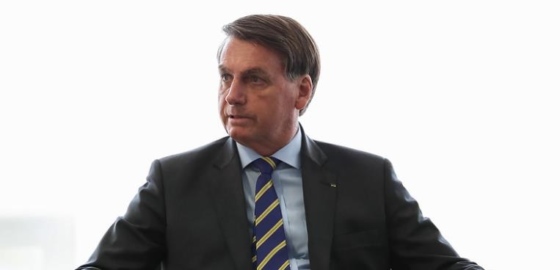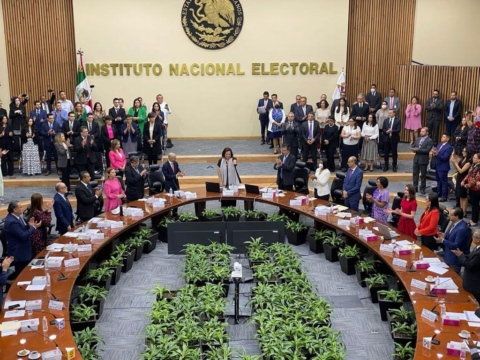
Is Brazil’s Military Getting Too Involved in Domestic Politics?
A Latin America Advisor Q&A featuring experts’ takes on the clash of democratic institutions in Brazil under President Jair Bolsonaro.
Q: A dispute between El Salvador's legislative and judicial branches escalated to a constitutional crisis this month, with two separate groups of judges claiming to be the country's legitimate Supreme Court. After a stalemate and pressures both domestically and internationally to resolve the dispute, the two main political parties agreed to hold talks on July 24. What is behind the conflict? Does the conflict have implications for the state of the country's democracy or is it fundamentally a political issue? How should it be settled?
A: Francisco Altschul, El Salvador's ambassador to the United States: "President Mauricio Funes last week began a process of 'conflict-resolution' with all the political parties represented in the Legislative Assembly, including the main opposition party, ARENA. Through this process, partial agreements have already been made within the constitutional framework and in accordance with the rule of law. A comprehensive resolution is expected soon to end the conflict between the Supreme Court of Justice and the Legislative Assembly. In our opinion, we are witnessing the complicated process of consolidating the institutions in an emerging democracy. Twenty years ago, the situation between the Legislative Assembly and the Supreme Court would have been impossible, simply because all branches of government-executive, legislative and judicial, were controlled by the same group: Salvadoran economic elites and their political allies. The fact that we are now facing this issue is more a result of independent government institutions trying to define their limits, rather than a conspiracy to consolidate control by a political faction over other institutions. Our government is confident that we are moving in the right direction to find a solution. Almost a year ago we went through a quarrel between the Legislative Assembly and the Supreme Court of Justice which after weeks of political uncertainty was satisfactorily resolved. We are now facing a similar situation, which we all hope will end positively as soon as possible."
A: Mirte Postema, senior program officer in the Judicial Independence Program at the Due Process of Law Foundation: "El Salvador has seen a judicial revolution of sorts in the past couple of years. In 2009, five new judges were elected-four of whom were appointed to the Constitutional Chamber. These constitutional judges came to be characterized by their independence and their refusal to succumb to pressures from political and economic powers, which made the chamber an important model for judges in the region. However, this was clearly not to the liking of political powers. There have been numerous attacks on the Constitutional Chamber, most of which-such as Decree 743 of June 2011, that required decisions on constitutionality to be unanimous-originated in the Legislative Assembly. When the assembly decided that it would not implement the Constitutional Chamber's last decisions, declaring unconstitutional the appointments to the Supreme Court made in 2006 and 2012, a crisis erupted. This refusal is a very serious issue that affects the basis of democracy: the respect for the rule of law. It is extremely worrying that a state power, the Legislative Assembly, is so blatantly violating these principles. The only solution that is in compliance with rule of law principles is that the judgments are implemented: the judges initially appointed in 2006 and 2012 need to be selected again. The agreement that was reached between political parties and President Funes on July 24, in which all parties involved committed themselves to resolving this crisis within the limits of the Constitution, seems to be a step in the right direction. However, it remains to be seen how the agreement will be implemented. Either way, this crisis underscores the necessity of a more rigorous selection procedure for judges, providing a real investigation of candidates' merits and full transparency."
A: Michael Shifter, president, and Rachel Schwartz, program assistant, at the Inter-American Dialogue: "The conflict between El Salvador's National Assembly and judicial branch appears at its core to be a political dispute. In an act of political gamesmanship, the FMLN, in alliance with the GANA party, sought to appoint its candidates to the Supreme Court before losing its upper hand to rival ARENA in the April 2012 legislative elections. Yet both parties have resorted to such tactics. In 2006, ARENA, in a move similarly denounced by the Constitutional Court, also violated the mandate limiting the selection of justices to once per legislative term to engage in similar political jockeying. The current standoff may be largely political but it nonetheless has important implications for Salvadoran democracy. The crisis can be viewed in the context of other recent attempts to curtail the power of the court, which has recently assumed a more activist posture. In June 2011, President Funes signed into law a decree forcing the Constitutional Court to issue decisions unanimously, which would have severely hamstrung judicial decision-making and independence. The legislature overturned the law largely as a result of civil society pressure, a factor that could also break the current impasse. However, a resolution to the institutional crisis will most likely come about through political negotiations between the two major parties to find an agreed upon way to carry out new court selections. But beyond settling this dispute and regardless of who controls the legislature, the challenge of preserving judicial autonomy will likely remain given the prevailing political environment."
A Latin America Advisor Q&A featuring experts’ takes on the clash of democratic institutions in Brazil under President Jair Bolsonaro.
Earlier this year, tens of thousands of Mexicans took to the streets to protest newly enacted legislation gutting the country’s highly-regarded National Electoral Institute (INE) in advance of state elections this year and presidential elections in 2024.
